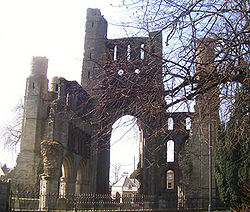Difference between revisions of "Roxburghshire"
From the Family Tree Forum Reference Library
| Line 2: | Line 2: | ||
[[Image:Roxburghshire.jpeg|250px|thumb|Kelso Abbey, Kelso submitted by Glen ]] | [[Image:Roxburghshire.jpeg|250px|thumb|Kelso Abbey, Kelso submitted by Glen ]] | ||
</div> | </div> | ||
| − | Description and Information taken from [http://www.scottish-towns.co.uk/index.html Scottish Towns]<br> | + | Description and Information taken from the [http://www.scottish-towns.co.uk/index.html Scottish Towns Website]<br> |
| + | |||
The greatest of all architectural attractions of this area are the ruined remains of Kelso Abbey. Long believed to be a relatively small abbey, it is now (due to a description found in the Vatican Library) widely held to have been a massive structure and most likely the largest of all the Border abbeys. Founded by King David I in 1128 it stood for over 400 years before it was destroyed in 1545. Kelso Abbey was unique in Scotland because of its many Norman architectural features. | The greatest of all architectural attractions of this area are the ruined remains of Kelso Abbey. Long believed to be a relatively small abbey, it is now (due to a description found in the Vatican Library) widely held to have been a massive structure and most likely the largest of all the Border abbeys. Founded by King David I in 1128 it stood for over 400 years before it was destroyed in 1545. Kelso Abbey was unique in Scotland because of its many Norman architectural features. | ||
| + | |||
| + | |||
Revision as of 21:08, 5 April 2007
Description and Information taken from the Scottish Towns Website
The greatest of all architectural attractions of this area are the ruined remains of Kelso Abbey. Long believed to be a relatively small abbey, it is now (due to a description found in the Vatican Library) widely held to have been a massive structure and most likely the largest of all the Border abbeys. Founded by King David I in 1128 it stood for over 400 years before it was destroyed in 1545. Kelso Abbey was unique in Scotland because of its many Norman architectural features.
Register Offices
reserved
Record Office and Cemetery Lookup Contacts
reserved
Links
Local History and Heritage
Back to Scotland
